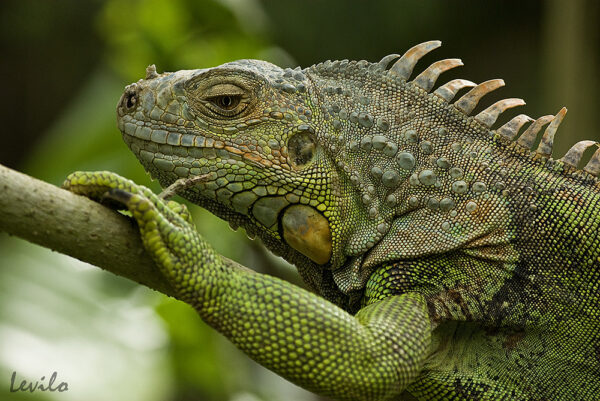Iguanas are a genus of lizards native to tropical areas of Mexico, Central America, South America, and the Caribbean. They belong to the scientific family Iguanidae, and their scientific name is Iguana iguana.
Physical Traits
Iguanas are large lizards with whiplike tails that are about half their length. They can range from green to brown to almost black, although they usually remain predominantly green as they mature. Adult iguanas can grow to 6.5 feet long and weigh about 11 pounds. They have stocky stature, saggy skin, and spines along their back and tail.
Life Span
Iguanas can live 15-20 years if cared for properly.
Habitat
Iguanas are found throughout Central and South America, from Sinaloa and Veracruz, Mexico, to the Tropic of Capricorn in Paraguay. They inhabit tropical rainforests near rivers or streams with plenty of vegetation to feed on.
Diet
Iguanas are herbivores that feed mainly on leaves, flowers, fruits, and vegetables such as squash, sweet potatoes, and carrots. They also eat insects such as crickets or mealworms occasionally for extra protein.
Reproduction
Female iguanas lay eggs in burrows or crevices in the ground, which hatch after 8-10 weeks depending on the environment’s temperature. The babies are independent of birth but may stay with their mother for protection until they reach maturity at around 2 years old.
Conservation Status
The conservation status of iguanas varies from species to species. Still, overall they are not considered endangered due to their wide distribution across many countries in Central and South America and their ability to adapt to different environments. However, some species, such as the Lesser Antillean Iguana (Iguana delicatissima), are listed as critically endangered by the IUCN Red List due to habitat loss caused by human activities such as deforestation and urbanization.
Interesting Facts
- Iguanas have excellent eyesight, which helps them spot predators from far away distances so they can quickly escape if needed!
- Iguanas can change color depending on their mood or temperature – darker colors indicate stress or fear, while lighter colors indicate contentment or relaxation!


